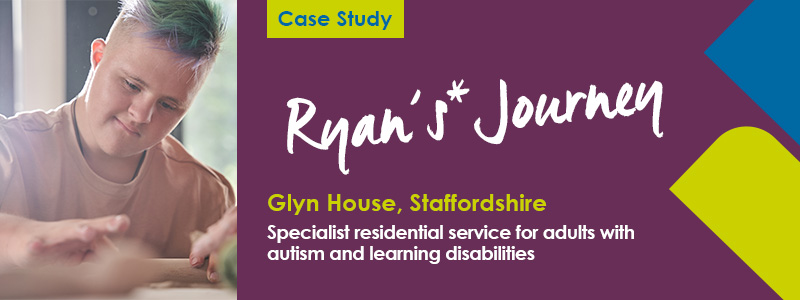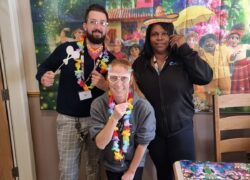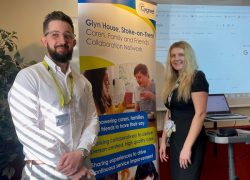
Ryan’s* history
Ryan comes from a large family with lots of siblings and at a very young age, he was diagnosed with Autism. He lived at home and attended a day service, however they soon struggled to meet his needs and manage his behaviour. It was later decided that in order to give Ryan the dedicated support he require, that he would benefit from residential care. He was placed within a service, upon the service closing, Ryan was referred to Glyn House.
When Ryan came to us
When Ryan joined us at Glyn House he was very reserved, he liked his own space and feeling that others were too close to him would trigger anxious behaviours. He would isolate himself away from others as much as possible. His previous placement had supported Ryan to improve some aspects of his personal care, however his daily living skills needed developing.
Ryan still required lots of staff support to complete tasks and often needed things like cooking and cleaning to be done for him. When feeling anxious or overstimulated, Ryan could lash out and display aggression towards others. Ryan is non-verbal, which led him to feel frustrated if he couldn’t express his needs. Due to these risks he was not able to access the community.
Ryan’s care
With knowledge of Ryan’s anxieties around change and his personal space, staff took things very slowly when Ryan had just moved in. They allowed him space to sit alone in the lounge, initially observing from the doorway. Gradually, they would increase communication with Ryan and move closer, until he was happy with staff sitting in the same room. It was slow progress but the team were patient and persistent, working at a pace that Ryan was comfortable with.
Once they had built more of a trusting relationship, staff were able to encourage communication with Ryan by using photo cards. They took photos of every possible element of his day so that he was able to prompt staff for the things he wanted or needed. This allowed Ryan to find comfort in routine, and with the staff having a clear idea of Ryan’s needs they were able to encourage him to complete tasks more independently.
The team found that giving Ryan the responsibility to take initiative with daily tasks, choose his clothes for example, led to him feeling calmer and being able to complete the tasks without feeling frustrated. The team also introduced Ryan to their sensory room, which he responded well to, and the amount of incidents began to reduce.
In order to support Ryan to access the community, a staged approach was used. The service’s car was parked on the courtyard and Ryan was supported to explore inside and get used to sitting down and putting his seatbelt on, so that the new sensory experience could be managed by himself and at his pace.
Staff continued to offer new therapeutic activities and experiences for Ryan, he is happy to try out the new things with staff, but knows what he likes and loves to stick to his routine.
Ryan today
Ryan has made fantastic progress which staff and his family are proud of. He now makes his own breakfast every morning, with staff on hand if he asks for help. Although still preferring his own space and time alone, he has a good relationship with the staff and is more tolerant of other residents – taking himself away for alone time when he needs to. He is coping well with challenges such as changes in other residents or new staff.
Ryan has been out and about in the car for short drives and the team are working towards visiting some quiet parks in the near future. Ultimately, they hope that Ryan will be able to access some community based activities and will continue to work with him to enable him to achieve this goal.
“The relationships that staff have built with Ryan has been pivotal in him being able to access the community, it is great to be able to support him and give him the opportunity to explore the world around him” – Service Manager
*Name has been changed to protect his identity




